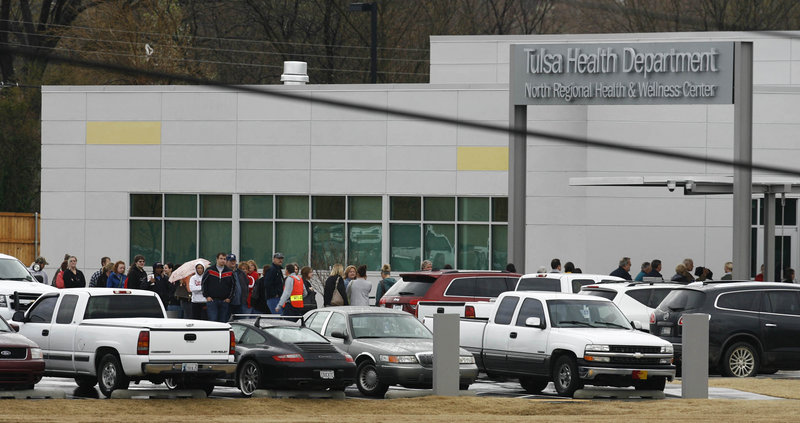TULSA, Okla. — About 150 to 200 patients of a Tulsa oral surgeon accused of unsanitary practices queued outside a health clinic Saturday, hoping to discover whether they were exposed to hepatitis or the virus that causes AIDS.
Letters began going out in stages Friday to 7,000 patients who had seen Dr. W. Scott Harrington during the past six years – warning them that poor hygiene at his clinics created a public health hazard. The one-page letter said how and where to seek treatment but couldn’t explain why Harrington’s allegedly unsafe practices went on for so long.
Testing for hepatitis B, hepatitis C and the virus that causes AIDS began at 10 a.m. Saturday, but many arrived early and stood through torrential downpours.
Kari Childress, 38, showed up at the Tulsa Health Department North Regional Health and Wellness Center at 8:30 a.m., mainly because she was nervous.
“I just hope I don’t have anything,” said Childress, who had a tooth extracted at one of Harrington’s two clinics five months ago. “You trust and believe in doctors to follow the rules, and that’s the scariest part.”
Inspectors found a number of problems at the oral surgeon’s clinics in Tulsa and suburban Owasso, according to the state Dentistry Board, which filed a 17-count complaint against Harrington pending an April 19 license revocation hearing. According to the complaint, needles were reinserted into drug vials after being used on patients, expired drugs were found in a medicine cabinet and dental assistants administered sedatives to patients, rather than the doctor.
One patient, Orville Marshall, said he didn’t meet Harrington until after he had two wisdom teeth pulled about five years ago at the Owasso clinic. A nurse inserted the IV for his anesthesia; Harrington was there when Marshall came to.
“It’s just really scary, it makes you doubt the whole system, especially with how good his place looked,” said Marshall, 37.
An instrument set reserved for use on patients with infectious diseases was rusty, preventing its effective sterilization, and the office autoclave – a pressurized cleaner – was used improperly and hadn’t been certified as effective in at least six years, according to the complaint.
Dr. Matt Messina, a practicing dentist in Cleveland and a consumer adviser for the American Dental Association, said creating a safe and hygienic environment is “one of the fundamental requirements” before any dental procedure can be performed.
“It’s not hard. It just takes effort,” he said.
Weekly autoclave testing can be performed for less than $400 annually, according to the website of the Autoclave Testing Services of Pearl River, N.Y.
Autoclaves themselves typically can be purchased for $1,000 to $8,000, depending on their size and features. And an average dental practice can expect to pay more than $40,000 a year in equipment, tools and supplies alone, according to several dental organizations.
Attempts to reach Harrington have been unsuccessful. No one answered the door Thursday at his home, which property records show is worth more than $1 million. His practice a few miles away, in a tony section of the city where plastic surgeons operate and locals congregate at bistros and stores like Saks Fifth Avenue, has a fair-market value of around $851,000.
His malpractice lawyer, Jim Secrest II, did not respond to phone messages left Thursday or Friday. A message at Harrington’s Tulsa office said it was closed and an answering service referred callers to the Tulsa Health Department.
State epidemiologist Kristy Bradley and Tulsa Health Department Director Bruce Dart sent letters Friday to all 7,000 patients they found in Harrington’s records, urging them to be screened. More patients may be at risk, but Harrington’s files go back only to 2007.
Nursing student Anisa Lewis, 22, said Harrington had a good reputation in the community, and friends recommended his practice when she had to get her wisdom teeth taken out in 2005.
“I’m a little nervous because I read the complaints filed against him, and in nursing school, we’re taught how to handle and clean our instruments, she said. “It was very shocking to read some of the allegations,” which she called “far beyond the pale of the precautions you’re supposed to taking.”
Susan Rogers, the executive director of the state Dentistry Board, said her agency has a budget of around $1 million, much of that generated from license renewal fees and dentist certification. It also has only five employees to monitor more than 2,000 dentists.
The state Dentistry Board’s website revealed part of the problem.
“With three incoming telephone lines and essentially one person handling the phones, emails, snail mail, renewals, new license/permit applications, walk ins … we will miss phones calls,” the website says.
“So follow the instructions on the message,” the site says. “We will respond to your request as soon as we can in the order in which it is received, but it will take time. We appreciate your patience.”
Send questions/comments to the editors.



Success. Please wait for the page to reload. If the page does not reload within 5 seconds, please refresh the page.
Enter your email and password to access comments.
Hi, to comment on stories you must . This profile is in addition to your subscription and website login.
Already have a commenting profile? .
Invalid username/password.
Please check your email to confirm and complete your registration.
Only subscribers are eligible to post comments. Please subscribe or login first for digital access. Here’s why.
Use the form below to reset your password. When you've submitted your account email, we will send an email with a reset code.